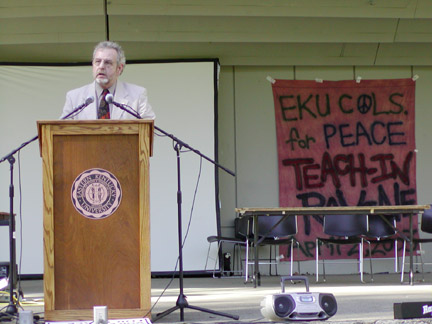
Teach-In
 Eastern
Kentucky University
Eastern
Kentucky University
Students and faculty at Eastern Kentucky University are planning a teach-in on our campus in Richmond, KY, on Wednesday, April 2, 2003. I am one of several historians involved with the EKU Colonels For Peace, the campus peace group. As more details of the event become available, I will forward these on to the Historians Against the War Coordinating Committee. Thank you.
What follows is our local town paper's report of our Teach-In Against the War, held on Wed., April 2, 2003, on the campus of Eastern Kentucky University. While the article does not state it, this event was part of the Historians Against the War national teach-in campaign. Also, the crowd was closer to 100 than to 50!
EKU students gather for war teach-in at Ravine
By Kristin Taylor
Richmond (KY) Register
Kristin Taylor can be reached at ktaylor@richmondregister.com.
Story created Thursday, April 03, 2003.
In 1968, Ron Taylor protested the Vietnam War in Cedar Rapids, Iowa. He shared his experiences with a Richmond audience Wednesday afternoon during a teach-in about the war in Iraq.
"This war is similar to then in that we are in a war that does not have universal approval," said Taylor, 61, an art student at Eastern Kentucky University.
Taylor said Richmond reminds him of Cedar Rapids.
"We had 5,000 people on the streets in a town of 100,000," he said. "I'm not afraid of small numbers. I've been there before."
More than 50 students and faculty members gathered at EKU's Ravine to listen to speakers, who talked about topics such as health effects of war, Middle East crisis history, religious aspects of war and protests, peace movements, international law and political aspects of war and protests. Speakers included both students and faculty members.
EKU Colonels for Peace and the school's Green Party organized the teach-in about the Iraq conflict in an attempt to educate people about viewpoints that may not be communicated in the mainstream media. Organizers collected money to buy phone cards to send to U.S. troops so they can call home.
The same groups organized an anti-war protest and march across campus
March 5 in conjunction with the national campaign "Books Not Bombs."
"We want to eliminate ignorance on campus," said EKU Green Party
President Audrey Combs. "Ignorance runs rampant here. We got their
attention at the rally, and now we want to keep it."
Bob Topmiller, a visiting history professor at EKU who helped organize the event, said he wanted to present pro-peace information to balance the war coverage on television.
"Another obstacle we are dealing with is once war starts, people think you can't protest," he said. "The reason we wanted to have the teach-in is we felt it was more appropriate."
Topmiller and other speakers stressed they support the troops, despite their opposition to the military action.
"When the country is at war, the wars are fought on two levels - on the home front and the battlefield," he said.
 In
his address to the audience, Topmiller said the U.S. government has killed
thousands of troops and veterans since 1945 with its obsession with science-driven
military technology. Topmiller, who was wounded twice in his Vietnam service,
spoke about how the current war impacts military personnel.
In
his address to the audience, Topmiller said the U.S. government has killed
thousands of troops and veterans since 1945 with its obsession with science-driven
military technology. Topmiller, who was wounded twice in his Vietnam service,
spoke about how the current war impacts military personnel.
Topmiller said at least one-third of all Vietnam veterans suffer from some form of post-traumatic stress disorder. Also, 164,000 Gulf War veterans have disabilities from a war during which no American soldier was killed in direct contact with Iraqi forces, he told the audience.
"I believe what is going on in Iraq today will lead to some of the same problems (as Vietnam) because they are fighting in the same kind of environment with no safety," Topmiller said. "... We have destroyed so many lives from the Gulf War - people who weren't even in danger during the war."
Two speakers - Combs and Topmiller - called for a ceasefire and negotiations rather than continuing to wage war.
"I agree with Audrey, I'm calling for a ceasefire and start the
negotiations to bring our kids home before the U.S. government kills them,"
he said.
EKU history professor Mick Lewis spoke about the history of the Middle
East conflict, particularly the last 20 years.
"I think it is important to remember the things of which Saddam is being charged are not new by any means," he said in an interview before the teach-in. "They go back two decades or more."
EKU student Nathan McGee, 19, of Covington, listened to speakers Wednesday. While he hasn't watched much war coverage on television, he said it is important people remember different viewpoints exist and not all information is presented on TV.
"I just want people to recognize that while we are at war, it doesn't make any other opinions less valuable," he said.
One speaker defined patriotism as "love to and devotion to one's country."
Amy Carberry, an EKU freshman from Middletown, Ohio, said she supports the U.S. troops but opposes the war. Before the teach-in, Carberry said that doesn't make her any less patriotic. Sitting in the Ravine, she said the teach-in would communicate that message: "It will get out the word that just because you are against the war doesn't mean you are unpatriotic."
Dr. Peter Alegi
Department of History
Eastern Kentucky University
Keith 323
521 Lancaster Avenue
Richmond, KY 40475
Tel 859.622.1360
peter.alegi@eku.edu